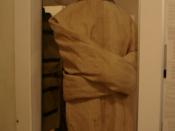'Stasiland shows that fact is often stranger than fiction.' Discuss.
Introduction
The quotes chosen by Anna Funder to preface Stasiland provide the reader with immediate clues that her story will test their definitions of fact and fiction, of fantasy and reality. What will Funder discover as she 'falls down the rabbit-hole' during her 'Adventures in Stasiland'? Will it be 'a silent crazy jungle under glass' or 'Sentence first - verdict afterwards' as suggested by Funder's chosen quotes? As the readers immerse themselves in Stasiland, it becomes very difficult at times to remember that this is a non-fiction text. We know the facts behind the division of Germany into East and West. We know the date the Berlin Wall went up and the day it came down. However, what is harder to determine are the personal truths of both the victims and perpetrators of a regime that at times seemed incapable of distinguishing between fact and fiction itself.
Funder's description of Erik Mielke's four hour speech at a lavish meal in October 1989 whilst growing crowds of demonstrators gathered outside, a speech that failed to even acknowledge the impending collapse of the regime, highlights that fact can be stranger than fiction, especially in the GDR.
Paragraph 1
Funder's mission to discover stories of victims and perpetrators: of men who worked for the Stasi and those who suffered under one of the most efficient surveillance states in human history, is spurred by a letter she receives. 'History is made of personal stories' argues the letter writer when Funder's TV station bosses reject his suggestion that the stories of ordinary people who lived in the GDR are told. They believe no one will be interested, that people have moved on. But Funder, curious like Alice, pursues her investigation, creating a...


